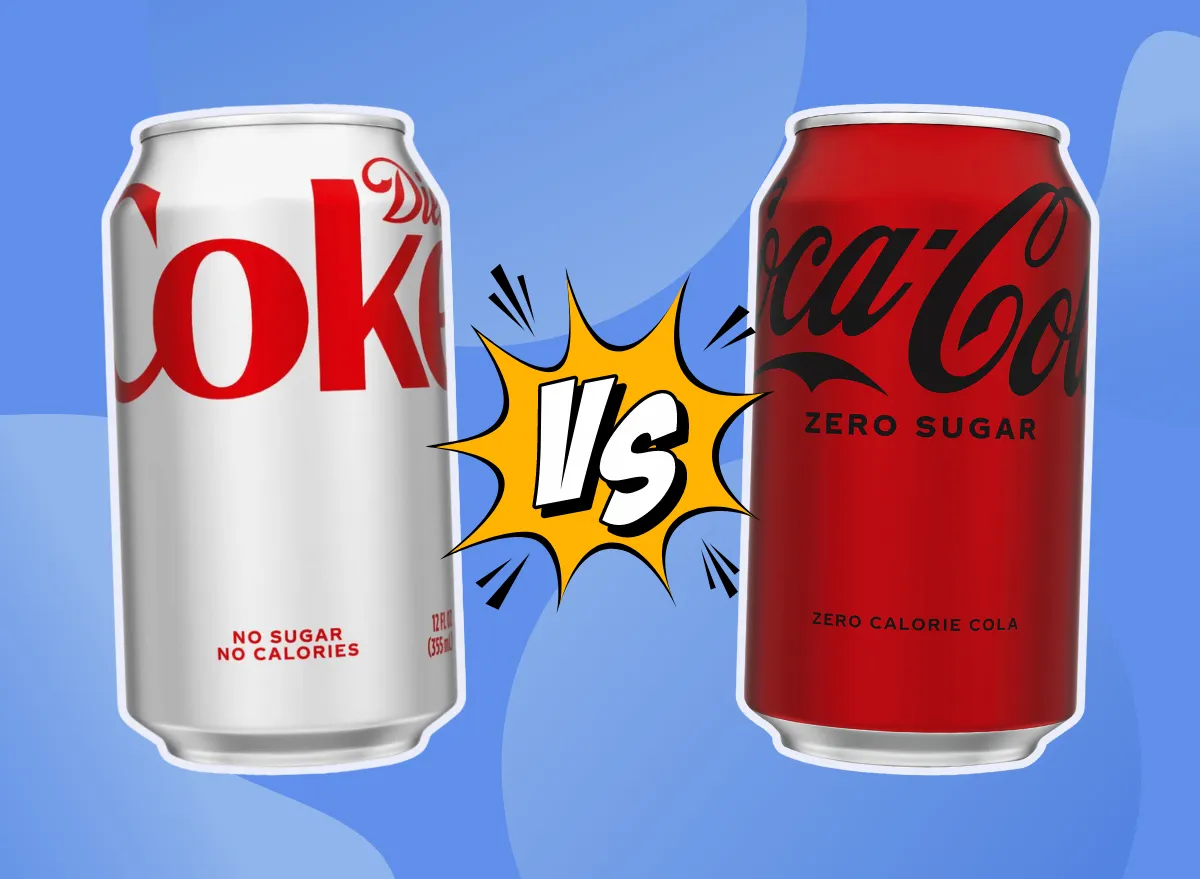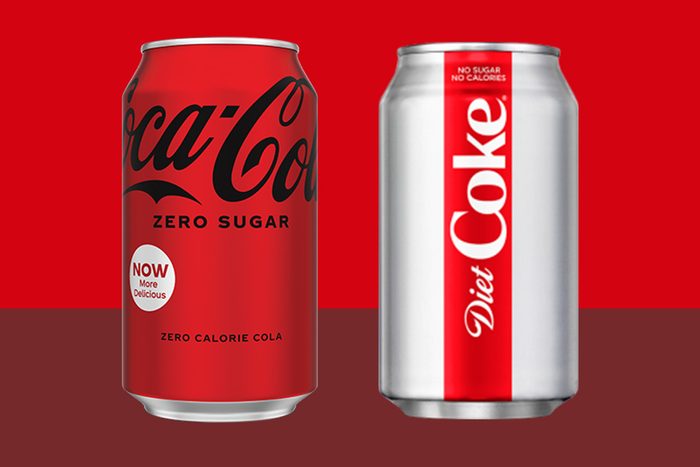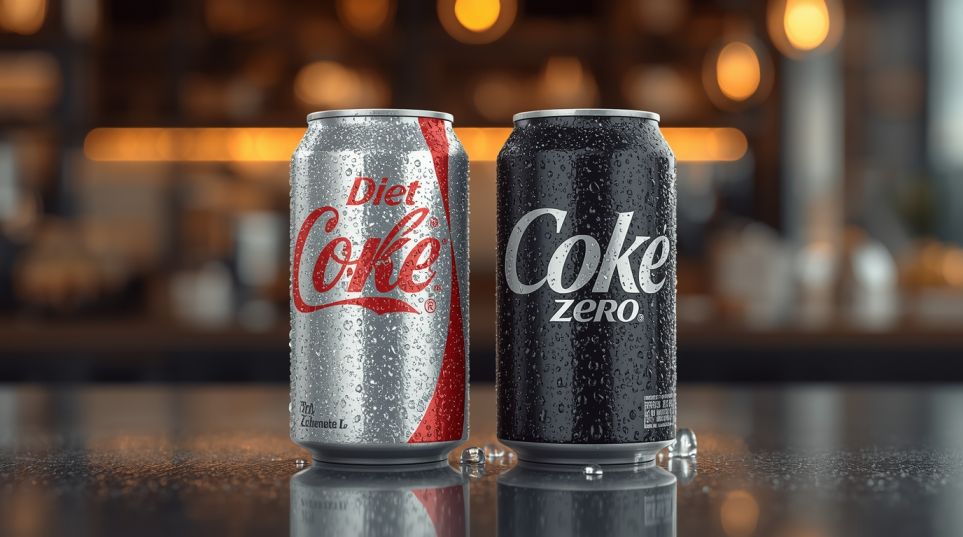Have you ever found yourself standing in the soda aisle, staring at the seemingly endless options and wondering, “What’s the difference between Diet Coke and Coke Zero?” You’re not alone.
Many people are puzzled by these two popular beverages, both promising a sugar-free experience but claiming distinct identities. If you’ve ever pondered which one suits your taste buds or dietary needs better, you’re in the right place. This article is crafted to satisfy your curiosity and help you make an informed choice.
By understanding the subtle yet significant differences between Diet Coke and Coke Zero, you’ll not only quench your thirst but also feel confident about your choice. So, let’s dive in and uncover what sets these fizzy favorites apart.
Product Background
Diet Coke and Coke Zero both offer sugar-free options but differ in taste and ingredients. Diet Coke uses a distinct blend of flavors, while Coke Zero aims to replicate the classic Coca-Cola taste. Both are popular among those seeking low-calorie sodas.
Understanding the distinction between Diet Coke and Coke Zero can feel like unraveling a classic soda mystery. Both drinks promise a sugar-free experience, but they have different histories and goals. This section will take you through their product backgrounds, helping you make an informed choice for your next fizzy indulgence.
Origins And Launch
Diet Coke was introduced in 1982 as a healthier alternative to regular Coke. It was created to cater to the growing demand for low-calorie beverages. You might remember the iconic silver can, representing a shift in consumer preferences at the time. Coke Zero, on the other hand, made its debut in 2005. It aimed to appeal to the younger crowd, particularly those who wanted the classic taste of Coca-Cola without the sugar. Its sleek black can was designed to stand out on shelves and attract a new generation of soda lovers.
Target Audience
Diet Coke has traditionally targeted health-conscious consumers looking to cut calories. It quickly became a favorite among those who wanted to maintain a balanced lifestyle while still enjoying their soda. Coke Zero, however, went after a different segment. It was marketed toward younger consumers and those who were more concerned with taste rather than just calories. If you’ve ever found yourself at a party reaching for the bold black can, you’re part of the brand’s intended audience. The flavor of Diet Coke is distinct and unique. It was created with a different formula than the original Coca-Cola, giving it a lighter, less sweet taste. Some fans even describe it as having a slightly more acidic kick. Coke Zero, in contrast, was crafted to mimic the original Coca-Cola taste as closely as possible. It uses a combination of artificial sweeteners to achieve this, providing a flavor experience that’s almost indistinguishable from the classic Coke. It’s the go-to choice if you’re chasing that traditional Coke flavor without the sugar load.
Personal Experience
Remember the time you were at a friend’s barbecue and reached for a Coke Zero, thinking it was regular Coke? The taste was so similar that you didn’t notice the difference. This is a testament to Coke Zero’s mission to replicate the original taste. But then, there’s that moment at the office when you sipped on a Diet Coke during a meeting. Its crisp, less sweet taste was a refreshing break from the usual sugary drinks, helping you stay focused without the sugar crash later. Which soda fits best into your lifestyle? Are you more about taste or calorie count? Understanding these differences can lead to more satisfying choices.

Credit: www.eatthis.com
Flavor Profile
When you grab a can of Diet Coke or Coke Zero, you’re likely expecting a refreshing burst of flavor. But have you ever wondered why they taste different? Understanding their flavor profiles is key to choosing which one suits your taste buds. While both are sugar-free options, they offer distinct taste experiences that might surprise you.
Sweetness And Tang
Diet Coke is known for its crisp, sharp taste. Its flavor is often described as having a tangy edge, almost like a brisk splash of citrus. This makes it a favorite for those who enjoy a lively zing.
On the other hand, Coke Zero tends to mimic the taste of classic Coca-Cola more closely. It offers a smoother, more rounded sweetness without the tangy bite. If you’re looking for something closer to the original Coke experience, Coke Zero might be your go-to.
Personal Preferences
Many people have strong opinions on which they prefer. You might find that Diet Coke’s tang resonates with you if you like a bold and distinct flavor.
Or, if you prefer a softer, less pronounced taste that stays true to the traditional Coke flavor, Coke Zero might be your match. It’s intriguing how personal taste can vary so much, even with similar products.
Taste Testing: A Fun Experiment
Why not conduct a taste test? Grab a can of each and sip them side by side. Notice the subtleties in flavor and see which you prefer. You might be surprised by how different they actually are.
Consider hosting a taste test with friends. It can be a fun way to explore these differences together and spark some lively conversation.
Beyond Flavor: What Influences Taste?
Flavor isn’t just about sweetness or tang. It’s also influenced by ingredients and your palate’s sensitivity. Coke Zero uses a blend of artificial sweeteners, while Diet Coke relies more on aspartame.
These subtle differences can impact how you perceive their taste. Have you ever noticed how your mood or the food you pair with them changes their appeal? It’s fascinating how context can alter your experience.
So, next time you reach for a diet soda, ask yourself: What flavor adventure am I in the mood for today? Understanding your preference can elevate your drinking experience to new heights.
Sweeteners Used
Many people enjoy low-calorie sodas like Diet Coke and Coke Zero. Both drinks promise a guilt-free soda experience. Yet, they differ in taste and ingredients. The sweeteners used in these drinks are a key distinction.
Sweeteners In Diet Coke
Diet Coke uses aspartame as its primary sweetener. Aspartame is a common sugar substitute. It has been used in various diet drinks for decades. Aspartame gives Diet Coke its unique taste. This sweetener is about 200 times sweeter than sugar. Hence, only a small amount is needed. Some people may notice a slight aftertaste.
Sweeteners In Coke Zero
Coke Zero uses a blend of aspartame and acesulfame potassium. This blend aims to mimic regular Coke’s taste. Acesulfame potassium, also known as Ace-K, is another sugar substitute. It is often used with aspartame to enhance sweetness. This combination gives Coke Zero a smoother flavor. Many say it tastes closer to classic Coca-Cola. The blend ensures a balanced sweetness without an aftertaste.
Why Different Sweeteners Matter
The choice of sweeteners affects flavor and consumer preference. Some people prefer Diet Coke’s distinct taste. Others enjoy Coke Zero’s resemblance to regular Coke. The difference in sweeteners caters to varied taste profiles. Both drinks offer a sugar-free alternative with unique flavors.
Caffeine Content
Caffeine is a key component of many popular beverages. It provides a stimulating effect that many people enjoy. Diet Coke and Coke Zero both contain caffeine. But their caffeine levels differ slightly. Understanding these differences can help consumers make informed choices.
Caffeine In Diet Coke
Diet Coke contains about 46 mg of caffeine per 12-ounce serving. This level provides a mild boost for those needing a little energy. Many people choose Diet Coke for its iconic flavor. It balances sweetness and caffeine well. This makes it a popular choice among soda drinkers.
Caffeine In Coke Zero
Coke Zero offers a similar caffeine level to Diet Coke. It has approximately 34 mg of caffeine per 12-ounce serving. The lower caffeine content suits those sensitive to caffeine. Coke Zero maintains the classic Coke taste. It does this without the sugar, appealing to many consumers.
Comparing Caffeine Levels
Both sodas offer caffeine but in different amounts. Diet Coke has more caffeine than Coke Zero. The choice between them often depends on personal preferences. Some prefer a slightly stronger caffeine boost. Others may seek a taste closer to regular Coke. Understanding these options helps individuals choose the right drink for their needs.
Caloric Differences
Understanding the caloric differences between Diet Coke and Coke Zero can help make informed choices. Both drinks cater to those seeking low-calorie options. Yet, subtle differences exist that may influence your preference. Each beverage has its unique formulation, appealing to different taste buds. Dive into the specifics to see what sets them apart.
Caloric Content Of Diet Coke
Diet Coke contains zero calories. It uses artificial sweeteners instead of sugar. This makes it a popular choice for calorie-conscious individuals. The absence of calories does not compromise its flavor. Many enjoy its crisp and refreshing taste.
Caloric Content Of Coke Zero
Coke Zero also boasts zero calories. Like Diet Coke, it replaces sugar with artificial sweeteners. It aims to mimic the classic Coca-Cola taste. Fans appreciate its close resemblance to the original. This makes it appealing to traditional soda lovers.
Key Differences In Caloric Formulation
While both are zero-calorie, they differ in sweetener composition. Diet Coke uses aspartame as its primary sweetener. Coke Zero combines aspartame with acesulfame potassium. This blend provides a taste closer to regular Coke. Each drink’s unique formula impacts its flavor profile.
Impact On Weight Management
Both sodas support weight management goals. Zero calories mean no added caloric intake. They offer a guilt-free indulgence for soda lovers. Choosing between them depends on personal taste preferences. Both are excellent choices for reducing calorie consumption.

Credit: www.tasteofhome.com
Marketing Strategies
Marketing strategies play a crucial role in differentiating Diet Coke and Coke Zero. These strategies shape consumer perception and influence purchasing decisions. Both drinks target health-conscious consumers with distinct approaches.
Brand Positioning
Diet Coke focuses on lifestyle choices and appeals to loyal customers. It emphasizes a classic taste with fewer calories. This positioning targets individuals who prioritize wellness without changing their habits.
Coke Zero targets a younger, dynamic audience. It highlights a bold flavor with zero sugar. The brand positions itself as a modern alternative to traditional cola. This attracts adventurous consumers seeking new experiences.
Packaging And Design
Diet Coke uses a sleek, silver look. This design signifies elegance and sophistication. It resonates with consumers who value aesthetics and tradition.
Coke Zero opts for a black and red theme. This vibrant design conveys energy and excitement. It appeals to consumers who enjoy a bold and lively lifestyle.
Advertising Campaigns
Diet Coke campaigns often feature celebrities and lifestyle influencers. These ads promote an aspirational lifestyle. They connect with consumers who admire fame and success.
Coke Zero ads focus on action and adventure. They showcase thrilling experiences and challenges. This approach attracts consumers who seek excitement and novelty.
Social Media Engagement
Diet Coke engages users with interactive content. It encourages sharing personal health journeys. This strategy builds community and loyalty.
Coke Zero leverages hashtags and viral challenges. It fosters engagement through contests and collaborations. The brand taps into trends to increase visibility.
Consumer Preferences
Consumer preferences play a crucial role in determining beverage success. Different tastes and health considerations influence choices between Diet Coke and Coke Zero.
Flavor Preferences
Many consumers prefer the taste of Coke Zero. It mimics the original Coca-Cola flavor more closely. Others lean towards Diet Coke for its unique taste. This difference in flavor often guides consumer choice.
Health-conscious individuals may choose based on nutritional content. Both drinks contain zero sugar. But some believe the ingredients in Coke Zero offer a slightly healthier option. Personal health goals and ingredient awareness shape these preferences.
Brand Loyalty
Brand loyalty influences many buyers. Some drinkers have a long-standing preference for Diet Coke. Others have switched allegiance to Coke Zero due to its taste. Marketing and personal experiences affect these loyalties.
Demographic Trends
Age and lifestyle can affect beverage choice. Younger consumers might prefer Coke Zero for its contemporary appeal. Older consumers might stick with Diet Coke out of habit. These trends reflect broader consumer patterns.
Health Considerations
Considering health aspects is crucial when choosing between Diet Coke and Coke Zero. Both drinks are sugar-free, aiming to offer a healthier alternative to regular soda. Yet, they differ in ingredients, which can affect health differently.
Ingredients And Sweeteners
Diet Coke uses aspartame as its primary sweetener. Aspartame is a widely used sugar substitute with approval from health authorities. Coke Zero also uses aspartame but combines it with acesulfame potassium. This combination gives Coke Zero a taste closer to regular Coke.
Caloric Content
Both Diet Coke and Coke Zero have minimal calories. They offer a guilt-free option for those watching calorie intake. The absence of sugar means they don’t contribute to weight gain directly.
Impact On Blood Sugar
Neither drink raises blood sugar levels. Their sugar-free formulation makes them suitable for people managing diabetes. Always consult a healthcare provider for personalized advice.
Effect On Weight Management
These drinks can support weight management by reducing sugar intake. Substituting sugary sodas with these can cut down daily caloric consumption. Yet, their role in weight loss isn’t fully proven. Healthy eating habits are still essential.
Dental Health Considerations
Both drinks contain acids that can affect dental health. The acid can erode tooth enamel over time. Regular dental care is important to counteract potential damage.
Global Availability
Diet Coke and Coke Zero differ mainly in taste and ingredients. Diet Coke uses aspartame, while Coke Zero uses a blend of aspartame and acesulfame potassium for a taste closer to regular Coke. Both drinks are sugar-free and have similar calorie content.
When it comes to choosing between Diet Coke and Coke Zero, a key factor that might influence your decision is their global availability. Both beverages are Coca-Cola products, which means they’re widely distributed. However, their presence can vary depending on where you are in the world. Let’s delve into how these two popular drinks stack up in terms of availability across different regions.
Global Presence Of Diet Coke
Diet Coke has been around since the early 1980s. It’s a staple in many countries and is often found in supermarkets, convenience stores, and restaurants. If you’ve ever traveled, you might have noticed Diet Coke on the menu of international flights or in hotel mini-bars. Its widespread availability makes it a reliable choice for those watching their sugar intake. Whether you’re in Europe, Asia, or the Americas, you can usually find a can of Diet Coke. This consistency is comforting when you’re in an unfamiliar place and want a taste of home.
Coke Zero’s International Reach
Coke Zero is a bit younger, having launched in the mid-2000s. It was designed to taste more like the original Coca-Cola, appealing to those who want the classic Coke flavor without the sugar. While it’s gaining traction, its availability can be more limited compared to Diet Coke. In some regions, Coke Zero is marketed more aggressively, while in others, it may not be as prominent. This can sometimes lead to a treasure hunt if you prefer Coke Zero and are traveling. Have you ever found yourself searching for your favorite drink in a foreign country?
Regional Preferences And Marketing Strategies
Diet Coke and Coke Zero cater to different taste preferences and dietary needs. In some areas, one might be more popular than the other due to local consumer trends or marketing strategies. For instance, countries with a strong preference for the classic Coke taste might stock more Coke Zero. On the other hand, places with a long-standing diet beverage market might lean towards Diet Coke. Which one do you see more often in your local stores? This can be a fun observation next time you’re shopping.
Availability Challenges And Insights
Global availability sometimes poses challenges. Import restrictions, regional marketing decisions, and even consumer demand can affect what you find on the shelves. This makes it interesting to track how your favorite drink’s presence changes as you travel. Have you ever tried a local version of these drinks? Some countries offer unique flavors or formulations to cater to local tastes, adding an extra layer of excitement to your beverage choice. Keep an eye out next time you’re exploring a new place! Understanding the global availability of Diet Coke and Coke Zero can enhance your travel experience. It also highlights how companies adapt to consumer preferences worldwide. Which drink do you prefer, and how does its availability affect your choice?

Credit: recipes.howstuffworks.com
Frequently Asked Questions
What Is The Main Difference In Taste?
Diet Coke and Coke Zero have distinct taste profiles. Diet Coke offers a lighter taste with a citrusy note. Coke Zero is designed to taste more like the original Coca-Cola, providing a similar classic flavor without the sugar.
Do Diet Coke And Coke Zero Have The Same Ingredients?
Both drinks contain artificial sweeteners, but they differ slightly in formulation. Diet Coke uses aspartame exclusively, while Coke Zero combines aspartame with acesulfame potassium. This combination gives Coke Zero a taste closer to regular Coca-Cola.
Are There Calorie Differences Between Diet Coke And Coke Zero?
Both Diet Coke and Coke Zero contain zero calories. They are formulated to provide a sugar-free, low-calorie option for soda lovers. Despite similar calorie content, their unique formulas cater to different taste preferences.
Which Is Healthier, Diet Coke Or Coke Zero?
Both options are sugar-free, making them healthier than regular cola. Their healthiness depends on individual dietary needs and preferences. Consuming them in moderation and considering other health factors is essential for overall well-being.
Conclusion
Diet Coke and Coke Zero both offer sugar-free options. The main difference is taste. Diet Coke has a lighter flavor. Coke Zero tastes more like regular Coke. Both drinks have similar ingredients. They use different sweeteners. Diet Coke uses aspartame.
Coke Zero uses a blend. Choose based on your taste preference. Some prefer Diet Coke’s crisp taste. Others enjoy Coke Zero’s bold flavor. Both are low-calorie choices. Ideal for those watching sugar intake. Ultimately, the choice is personal. Try both to see which you prefer.
Enjoy your favorite without guilt.



